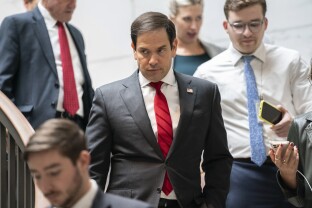Secretary of State Marco Rubio is facing concerns about the department’s foreign aid freeze from one of his own close allies: his former staff director on a commission that handles China policy.
Peter Mattis, now the president of The Jamestown Foundation think tank, told senators on Thursday that if he were a senior Chinese government official, he “would be looking to exploit the opportunity” in the Philippines after Rubio’s State Department under Donald Trump halted international aid.
“If I were a senior official in the United Front Work Department, I would be doing everything I can to exploit whatever chaos is there in the U.S.-Philippine relationship,” Mattis said when asked about the freeze by Sen. Brian Schatz during a Senate Foreign Relations Committee hearing.
“There are the sort of traditional tools of corruption,” Mattis said, but “I would be looking also to mobilize groups to lobby politicians to say, ‘Well, look, the U.S. is an unreliable ally,’ and that, ‘You need to pull, you need to move in this other direction.’”
The Philippines is seen as strategically important in countering Chinese aggression. The Biden administration pledged $550 million in military aid to the Philippines last summer. Lawmakers from both parties want to build its relationship with the United States, rather than allowing the Chinese government to grow its influence there.
Mattis was once a counterintelligence analyst at the Central Intelligence Agency and later served as the Senate staff director for the Congressional-Executive Commission on China when Rubio was co-chair of the panel. Mattis and Rubio’s other Senate staffers helped shepherd the Uyghur Forced Labor Prevention Act through the Senate and worked on legislation related to Hong Kong while he served on the commission.
Mattis added on Thursday that the Chinese government has long had ambitions to strengthen ties in the Philippines. He cautioned that even without the aid freeze complicating diplomacy, “there are always opportunities to exploit.”
The State Department said in a statement this week that “no foreign nation is entitled” to aid, “and no foreign aid program is above scrutiny.”
“The previously announced 90-day pause and review of U.S. foreign aid is already paying dividends to our country and our people,” the department’s press team added in the statement. “We are rooting out waste. We are blocking woke programs. And we are exposing activities that run contrary to our national interests.”
A spokesperson for the State Department did not immediately respond to a request for comment on Mattis’s remarks.
Rubio has approved a waiver for humanitarian aid, defined as “life-saving medicine, medical services, food, shelter, and subsistence assistance, as well as supplies and reasonable administrative costs as necessary to deliver such assistance.” The department also has a waiver request process that asks officials to justify specific programs.
Democrats on the Senate panel slammed the move and raised fears that it would hurt America’s competition with China.
Schatz, a Hawaii Democrat, said he sees the aid freeze as a moment of significance, warning that Chinese officials could “seize this opportunity of us looking like an unreliable partner.”
Sen. Chris Coons, a Delaware Democrat, shared the same concerns, noting that the Chinese government’s Belt and Road Initiative was intended to win favor around the world.
“I am particularly concerned about the possible expansion of China’s influence, both at home and abroad, as a result of a freeze on our foreign assistance,” he said. “There is nothing China wants to do more than limit the reach of our global influence.”
Maryland Sen. Chris Van Hollen, too, described it as “a gift to Beijing.”
Melanie Hart, another witness at the hearing — who directs the Atlantic Council’s Global China Hub and served at the State Department — argued the freeze has “given Beijing a blank check.”
It has also “kneecapped the United States and the entire global pro-democracy movement,” she said. “I have no doubt that Beijing is already showing up in capitals where the United States is pulling back and saying, ‘Here is your HIV medicine, and guess what? Here’s the three things you need to do for me today to get it.’”
—
Haley Byrd Wilt is a reporter at NOTUS.
Sign in
Log into your free account with your email. Don’t have one?
Check your email for a one-time code.
We sent a 4-digit code to . Enter the pin to confirm your account.
New code will be available in 1:00
Let’s try this again.
We encountered an error with the passcode sent to . Please reenter your email.


